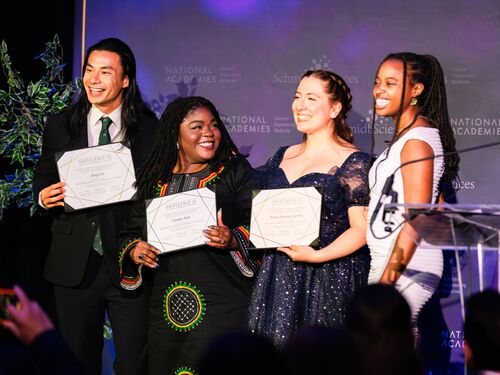GRP Awards Over $1 Million for Workforce Development to Support the Energy Transition
News Release
By Pete Nelson
Last update December 11, 2023
WASHINGTON ― The Gulf Research Program (GRP) of the National Academies of Sciences, Engineering, and Medicine has awarded $1.1 million to fund four projects that will support young people ages 16-25 in acquiring the skills, knowledge, and credentials necessary to enter careers in the future energy workforce.
The existing energy infrastructure and knowledge base in the Gulf region is advantageously positioned to integrate clean energy technologies as part of the nation’s commitment to achieve net-zero greenhouse gas emissions by 2050. In addition to leveraging existing infrastructure, a skilled technical workforce will be essential to strengthening the diverse energy environment of the future.
Skilled technical workers utilize science, technology, engineering, and mathematics (STEM) knowledge in their jobs and careers, but they often do not have a bachelor’s degree. These skilled technical workers are a vital part of the science and engineering enterprise that enable the benefits of STEM to reach the American public, such as in the deployment of clean energy technologies.
A 2017 report from the National Academies determined that “an insufficiently skilled workforce imposes significant burdens on the U.S. economy, including higher costs to workers and employers and lower economic productivity.” Careers for skilled technical workers typically provide good-paying jobs with fewer formal education requirements, facilitating quick entry into a workforce in which they are more likely to have a higher paying job and lower unemployment relative to other jobs at a similar education level.
“We’re really excited about this funding opportunity because it allows us to support local students, employers, and the economy by providing pathways for young people to enter high-quality jobs located in the Gulf region that will support the energy transition,” said Karena Mothershed, senior program manager of the GRP’s Board on Gulf Education and Engagement.
The funded projects are:
Student Scholarships for Center of Vocational Excellence (CoVE) for Offshore Renewables
Project Director: Jerry V. Graves Sr.
Organization: Nunez Community College
Project Location: Chalmette, Louisiana
Award: $321,772
Project Summary: Nunez Community College ― a traditionally minority serving institution ― delivers relevant and innovative curriculum leading to academic credentials and workforce opportunities. Nunez offers a Global Wind Organization-certified associate of applied science-wind energy technology program, which prepares students for immediate employment as a wind turbine technician or for transfer to an institution of higher learning. Students within this program also earn a career and technical certificate in offshore safety and survival, and a technical diploma in wind Turbine mechanics and maintenance. The wind energy sector will offer new career opportunities within traditionally underserved communities. This project will support the first cohort of 20 students in the wind energy program with full scholarships, providing long-standing and tangible change for not only the community but also the country.
Empowering Tomorrow’s Workforce: Scholarships for Line Worker Program
Project Director: Danna Spires
Organization: Northwest Louisiana Technical Community College
Project Location: Minden, Louisiana Award: $160,000
Project Summary: Northwest Louisiana Technical Community College (NLTCC) is beginning a scholarship program for its 32-week power line worker program, aiming to create an accessible pathway for talented individuals to enter the energy sector. The grant will provide merit-based and needs-based scholarships covering tuition, books, and equipment to overcome financial barriers for aspiring students. NLTCC seeks to develop a skilled workforce of power line workers dedicated to the sustainable growth of the energy industry while advancing technical knowledge and skills that directly relate to regionally identified job needs and careers in the energy workforce. One of the core objectives of this scholarship program is to empower students to attain stackable industry credentials bolstering their employability within the energy sector. These credentials will validate the students’ expertise and increase access to job opportunities in the energy sector. The collaborative partnership between NLTCC and Southwest Electric Power Company will also ensure students have access to invaluable hands-on experience and mentorship from seasoned professionals in the energy sector. Their industry guidance will also ensure the training remains relevant to current industry trends and best practices, producing graduates who are not only job-ready but also well-equipped to thrive in a dynamic energy landscape.
TRACE: Texas Research Alliance for Clean Energy
Project Director: James ‘Chris’ Thomas
Organization: Texas A&M University
Project Location: College Station, Texas
Award: $471,874
Project Summary: TRACE: Texas Research Alliance for Clean Energy is a pilot academia/industry collaborative effort aimed at developing undergraduate engineering students in Texas specifically for the clean energy workforce. The pilot program includes five Texas-based universities, eight faculty members, seven Texas-based companies, eight industry partners, and eight undergraduate engineering students. Academic and industry partners have been strategically selected based on their expertise and ongoing work on clean energy technologies, including hydrogen and ammonia production, storage, transportation, combustion, and utilization; wave/wind energy harvesting; and carbon capture technologies. Undergraduate students will conduct research under their faculty mentor’s guidance at their host institution during the spring and fall semesters. The students complete a summer internship between the semesters with their host industry partner on a clean energy topic related to their research. The student participants are also required to attend seminars on clean energy topics, complete an industry-recognized credentialing program, and conduct STEM outreach activities. The main goal of this effort is to develop a sustainable, scalable, and collaborative multi-entity program that facilitates the development and training of undergraduate engineering students in the Gulf region. This program will enable student participants to successfully obtain careers in the regional clean energy workforce. In addition, the program will foster collaboration between participants and address lacking workforce skills and needs.
Solar and Electrical Concepts Apprenticeship
Project Director: Calvin Avant
Organization: Unity In The Family Ministry Inc.
Project Location: Pensacola, Florida
Award: $149,470
Project Summary: The Solar and Electrical Concept Apprenticeship workforce development program will target marginalized and underserved populations who are either unemployed or underemployed. The goal is to provide 25 16- to 25-year-old individuals with the skills that will prepare them to pursue a career as an electrician helper and/or a solar installer helper and support the energy transition from fossil fuel to solar energy. The program consists of a 12-week, 320-hour training program.
Student Scholarships for Center of Vocational Excellence (CoVE) for Offshore Renewables
Project Director: Jerry V. Graves Sr.
Organization: Nunez Community College
Project Location: Chalmette, Louisiana
Award: $321,772
Project Summary: Nunez Community College ― a traditionally minority serving institution ― delivers relevant and innovative curriculum leading to academic credentials and workforce opportunities. Nunez offers a Global Wind Organization-certified associate of applied science-wind energy technology program, which prepares students for immediate employment as a wind turbine technician or for transfer to an institution of higher learning. Students within this program also earn a career and technical certificate in offshore safety and survival, and a technical diploma in wind Turbine mechanics and maintenance. The wind energy sector will offer new career opportunities within traditionally underserved communities. This project will support the first cohort of 20 students in the wind energy program with full scholarships, providing long-standing and tangible change for not only the community but also the country.
Empowering Tomorrow’s Workforce: Scholarships for Line Worker Program
Project Director: Danna Spires
Organization: Northwest Louisiana Technical Community College
Project Location: Minden, Louisiana Award: $160,000
Project Summary: Northwest Louisiana Technical Community College (NLTCC) is beginning a scholarship program for its 32-week power line worker program, aiming to create an accessible pathway for talented individuals to enter the energy sector. The grant will provide merit-based and needs-based scholarships covering tuition, books, and equipment to overcome financial barriers for aspiring students. NLTCC seeks to develop a skilled workforce of power line workers dedicated to the sustainable growth of the energy industry while advancing technical knowledge and skills that directly relate to regionally identified job needs and careers in the energy workforce. One of the core objectives of this scholarship program is to empower students to attain stackable industry credentials bolstering their employability within the energy sector. These credentials will validate the students’ expertise and increase access to job opportunities in the energy sector. The collaborative partnership between NLTCC and Southwest Electric Power Company will also ensure students have access to invaluable hands-on experience and mentorship from seasoned professionals in the energy sector. Their industry guidance will also ensure the training remains relevant to current industry trends and best practices, producing graduates who are not only job-ready but also well-equipped to thrive in a dynamic energy landscape.
TRACE: Texas Research Alliance for Clean Energy
Project Director: James ‘Chris’ Thomas
Organization: Texas A&M University
Project Location: College Station, Texas
Award: $471,874
Project Summary: TRACE: Texas Research Alliance for Clean Energy is a pilot academia/industry collaborative effort aimed at developing undergraduate engineering students in Texas specifically for the clean energy workforce. The pilot program includes five Texas-based universities, eight faculty members, seven Texas-based companies, eight industry partners, and eight undergraduate engineering students. Academic and industry partners have been strategically selected based on their expertise and ongoing work on clean energy technologies, including hydrogen and ammonia production, storage, transportation, combustion, and utilization; wave/wind energy harvesting; and carbon capture technologies. Undergraduate students will conduct research under their faculty mentor’s guidance at their host institution during the spring and fall semesters. The students complete a summer internship between the semesters with their host industry partner on a clean energy topic related to their research. The student participants are also required to attend seminars on clean energy topics, complete an industry-recognized credentialing program, and conduct STEM outreach activities. The main goal of this effort is to develop a sustainable, scalable, and collaborative multi-entity program that facilitates the development and training of undergraduate engineering students in the Gulf region. This program will enable student participants to successfully obtain careers in the regional clean energy workforce. In addition, the program will foster collaboration between participants and address lacking workforce skills and needs.
Solar and Electrical Concepts Apprenticeship
Project Director: Calvin Avant
Organization: Unity In The Family Ministry Inc.
Project Location: Pensacola, Florida
Award: $149,470
Project Summary: The Solar and Electrical Concept Apprenticeship workforce development program will target marginalized and underserved populations who are either unemployed or underemployed. The goal is to provide 25 16- to 25-year-old individuals with the skills that will prepare them to pursue a career as an electrician helper and/or a solar installer helper and support the energy transition from fossil fuel to solar energy. The program consists of a 12-week, 320-hour training program.
The National Academies’ Gulf Research Program is an independent, science-based program founded in 2013 as part of legal settlements with the companies involved in the 2010 Deepwater Horizon disaster. It seeks to enhance offshore energy system safety and protect human health and the environment by catalyzing advances in science, practice, and capacity to generate long-term benefits for the Gulf of Mexico region and the nation. The program has $500 million for use over 30 years to fund grants, felloships, and other activities in the areas of research and development, education and training, and monitoring and synthesis.
The National Academies of Sciences, Engineering, and Medicine are private, nonprofit institutions that provide independent, objective analysis and advice to the nation to solve complex problems and inform public policy decisions related to science, engineering, and medicine. They operate under an 1863 congressional charter to the National Academy of Sciences, signed by President Lincoln.
Contact:
Pete Nelson, Director of Communications
Gulf Research Program
PNelson@nas.edu
More like this
Discover
Events
Right Now & Next Up
Stay in the loop with can’t-miss sessions, live events, and activities happening over the next two days.
NAS Building Guided Tours Available!
Participate in a one-hour guided tour of the historic National Academy of Sciences building, highlighting its distinctive architecture, renowned artwork, and the intersection of art, science, and culture.



